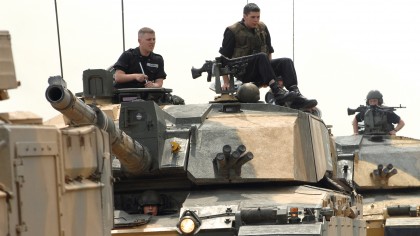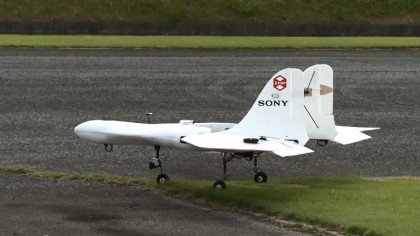We asked an SAS guy about drones, games, and the future of military tech
We're sat in a room with Steve. Steve's not his real name, mind you, just a borrowed one to disguise his real identity.
Steve is ex-SAS, has been on many operations overseas, spent time training guerrillas in Libya, and could without a doubt kill us with any object in the room should our conversation turn ugly.
For his latest assignment Steve was drafted by deep Silver to shoot a promotional video around its latest game Homefront: The Revolution, but we grabbed him for brief chat covering a wide range of topics.
There was a handful of tech-related points Steve touched on, which we thought we'd share. Here are a few of the best.
Military tech is only just ahead of your's
"There are things I'm not allowed to talk about for obvious reasons. I'd say only just ahead, and there's times where, due to our procurement processes, by the time that technical asset has got to the boots on the ground, it's then behind the times.
"Obviously there's the UOR program, the Urgent Operational Requirement program, which speeds up that procurement process, but ultimately that's not always the case. So with regard to the military I think we're only just ahead. With regard to intelligence capability we're significantly ahead than what is open source out there."

Night vision tech is now pretty damn good
"What the guys use now on the ground, it's light years away from what we were using 20 years ago. They're using stuff now that's waterproof, you can dive with it, jump out the water and you've got vision straight away, as opposed to carrying it in a waterproof bag, swimming into land and then getting it out and drying it and stuff like that. So yeah, it's come on leaps and bounds.
Sign up for breaking news, reviews, opinion, top tech deals, and more.
"We can pick up targets from multiple miles away, while a decade ago that would have never happened."
Where the focus on military technology will be in the future
"Night vision, definitely, and communications. Covert secure communications are important because every time you press the mic on your personal radio you've transmitted a signal that can be picked up by an enemy. So if we can reduce that as much as possible it's less likely for that team to get compromised.
"Obviously night vision and surveillance assets, that's of huge importance. I wouldn't call them the good old days, but there have been days we've had pilots exercise extreme measures using IR lasers to light up targets on our behalf. That's completely mitigated now, but if we can enhance that capability that would be a wonderful thing.
Surveillance… just general assets for a surveillance team to use. Listening devices, tracking devices, stuff like that. If we can make them more efficient, improve the battery life and stuff like that, then that would definitely."
On video games about war
"I think desensitization should never be an issue with regards to what's going out in there in the real world. I think it's important for everyone to understand what goes on during a hostile act, from both perspectives, and I've got no issues with the youth of today playing these games."
Sadly, Steve hadn't any thoughts on the latest, somewhat ridiculous trailer for Call of Duty: Infinite Warfare.

On the rise of drones in warfare
"To begin with, drones consisted of one drone for a whole battle group so you were struggling for drone space as such, and that asset to be afforded to your team on the ground for that particular op, and no there's that many departments within the army and air force and they're desperate to utilise, to throw their assets your way… it's down to the cost effectiveness of drones.
"Purely from a cost perspective, MOD budgets, governments love drones because they're cheap. And obviously the loss of life is mitigated because there's no one flying the drone. With that, because drones are a lot cheaper than multi-million pound jets, you can buy more of them, so there are more drones available to support the troops on the ground.
"You can never have as many close air support above you when you're on the ground, you're risking your life. From my perspective drones are a fantastic piece of kit. Not only for that but in terms of surveillance asset as well."
"Now obviously there is a huge compromise when drones do fail or get shot down, because the software within the drone is compromised, so software has to get rerouted, crypto has to get rewritten, which is an issue but in the grand scheme of things it's a small price to pay.
On the distance between drone users and consequences
"From my perspective there's a lot less going on. If a chap is sat in the Nevada desert in a comfortable surrounding flying a drone, because he's under less pressure, his life isn't at risk, he can make more calculated decisions, he can think before he acts.
"I've been involved with incidents where american jets have fired upon my teams, and that's purely down to user pilot error where we've given them our latitude and longitude to make sure they don't attack our position, and they've accidentally programmed that into the JDAM. So from our perspective that's less likely to happen if there's a guy sat in a comfy unit in the middle of the Nevada desert. I think drones are the way forward."
You can check out the aforementioned video, featuring Steve, below.

Hugh Langley is the ex-News Editor of TechRadar. He had written for many magazines and websites including Business Insider, The Telegraph, IGN, Gizmodo, Entrepreneur Magazine, WIRED (UK), TrustedReviews, Business Insider Australia, Business Insider India, Business Insider Singapore, Wareable, The Ambient and more.
Hugh is now a correspondent at Business Insider covering Google and Alphabet, and has the unfortunate distinction of accidentally linking the TechRadar homepage to a rival publication.